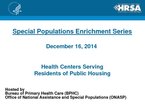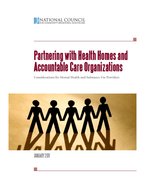Found 34 resources.
0
0
0
Marjorie Sims, Sarah Haight
January 2024
Focused on the 23,306 young parents (ages 18 to 24) and their families in New Mexico, this report provides a framework for organizations in New Mexico to collaborate more effectively and offers a plan of action to assess these efforts and strengthen impact for families.
This publication aims to deepen understanding about the demographics, aspirations, and needs of young parents; highlights practices and policies aligned with a two-generation (2Gen) approach; showcases opportunities to streamline this work by forging connections between...
Topics: Child welfare, Dual-generation, dual-generation initiative, Early childhood, Family engagement, Healthy homes, Housing
 Shared by Molli Caite Hughes
on Jan 18, 2024
Shared by Molli Caite Hughes
on Jan 18, 2024 0
0
0
Developed by listening to our community, the Alliance has compiled seven hallmarks that make up a person-first health system.
Topics: Advocacy, Community development, Health, Healthy homes, Medicaid / Medicare
 Shared by Molli Caite Hughes
on Dec 6, 2023
Shared by Molli Caite Hughes
on Dec 6, 2023 0
0
0
Homelessness and child welfare system involvement pose substantial challenges for families, but supportive housing can help them stay together and access secure housing.
Topics: Advocacy, Dual-generation, Healthy homes, Homelessness, Housing, Low-income, Stability
 Shared by Molli Caite Hughes
on Nov 15, 2023
Shared by Molli Caite Hughes
on Nov 15, 2023 0
0
0
This webinar includes a discussion about innovations in trauma-informed approaches to housing from expert speakers. We heard from Julianna Stuart-Lomax presenting about the POAH Trauma-Informed Housing Toolkit and their work in this area. Chad Holtzinger, president of Shopworks Architecture and partner of the Denver Housing Authority, discussed PHA trauma-informed practices at their Thrive project.
Topics: Healthy homes, Housing Is Working Group, Mental health
 Shared by Camille Anoll-Hunter
on Nov 15, 2023
Shared by Camille Anoll-Hunter
on Nov 15, 2023 0
0
0
Topics: Asthma, Healthy homes, Housing, Housing Is Working Group, Mental health, Mobility
 Shared by Camille Anoll-Hunter
on Sep 13, 2023
Shared by Camille Anoll-Hunter
on Sep 13, 2023 0
0
0
This webinar will describe new research that shows children whose families participated in a program that helped them move from distressed neighborhoods to areas with lower rates of poverty experienced significant improvements in severe asthma episodes. Before moving, for every 100 children, there were approximately 88 severe asthma attacks per year. After moving, there were approximately 40 severe attacks per year, a reduction of more than 50%. The webinar will explore factors that help explain these changes in asthma, including the critical role of neighborhood-related stress, and describes...
Topics: Asthma, Healthy homes, Housing, Mental health, Mobility
 Shared by Camille Anoll-Hunter
on Sep 13, 2023
Shared by Camille Anoll-Hunter
on Sep 13, 2023 0
0
0
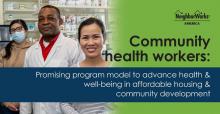
A Community Health Worker Program Development & Toolkit for Affordable Housing and Community Development Organizations
Topics: Health, Healthy homes, Housing
 Shared by Camille Anoll-Hunter
on Aug 3, 2023
Shared by Camille Anoll-Hunter
on Aug 3, 2023 0
0
0

Social service programs are often looking for ways to assess and improve program design and implementation, and are increasingly using rapid learning methods to do so. In rapid learning cycles, programs try a new approach, see how well it works, make modifications to strengthen it, and then try it again. This brief illustrates how 10 fatherhood programs used learning cycles to evaluate one of three promising approaches to engaging men in their services, and the ways they used data in the learning cycle process to make decisions about the design and implementation of the approaches. Even...
Topics: Family engagement, Healthy homes, Research
 Shared by Sandra Ware
on Jun 8, 2023
Shared by Sandra Ware
on Jun 8, 2023 0
0
0
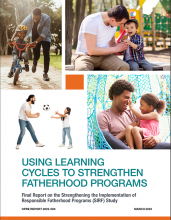
Federally funded Responsible Fatherhood programs work with fathers to promote healthy relationships and marriages, strengthen parenting practices, and help fathers attain economic stability. For programs to improve fathers’ outcomes, they need to be able to recruit fathers, engage them in services, and keep them actively participating in program activities. However, it is challenging for programs to achieve these participation goals. The Strengthening the Implementation of Responsible Fatherhood Programs (SIRF) study was designed to strengthen programs and build evidence on promising...
Topics: Family engagement, Healthy homes, Legislation & Policy, Low-income, Research, Stability
 Shared by Sandra Ware
on Jun 1, 2023
Shared by Sandra Ware
on Jun 1, 2023 0
0
0
Getting regular exercise can be a challenge, but there are many positive benefits, particularly for
people with diabetes.
Topics: Exercise, Health, Healthy homes, Nutrition
 Shared by Gabe Castro
on Sep 23, 2022
Shared by Gabe Castro
on Sep 23, 2022 0
0
0
The Effects of ‘Food Deserts’ on Public Housing Residents Living with Diabetes
Topics: Energy, Exercise, Health, Healthy homes, Mobility, Nutrition
 Shared by Gabe Castro
on Sep 23, 2022
Shared by Gabe Castro
on Sep 23, 2022 0
0
0
View this webinar to learn more about actions public housing authorities can take to promote environmental resiliency in their communities. We first heard from Natalie Hildt Treat, senior policy advisor for Building Electrification Initiative at Northeast States for Coordinated Air Use Management (NESCAUM). Treat discussed NESCAUM’s efforts in the field of environmental resiliency, including her work helping states harness the power of clean, efficient electric building technologies to meet their climate and air quality goals. Next, we heard a case study about how the Municipal Housing...
Topics: Energy, Environmental Resiliency/Climate Change, Green, Healthy homes, Housing Is Working Group, Sustainability
 Shared by Camille Anoll-Hunter
on Sep 14, 2022
Shared by Camille Anoll-Hunter
on Sep 14, 2022 0
0
0
The Vancouver Housing Authority collaborated with a Federally Qualified Health Center and a homeless crisis response system to develop a network of scattered-site and site-based supportive housing. This moderated discussion will cover how VHA paired Housing Choice Vouchers and public housing with a Medicaid-funded supportive housing benefit to serve people identified by the community’s Coordinated Entry as needing supportive housing. Speakers will also discuss the challenges faced through the process, model adjustments made, and evaluation of the work through matching housing data and...
Topics: Advocacy, CLPHA, Data sharing, Family engagement, Health, Healthy homes, Homelessness, Housing, Legislation & Policy, Low-income, Research, Stability, Sustainability
 Shared by Karina George
on Jun 17, 2022
Shared by Karina George
on Jun 17, 2022 0
0
0
NYC was an epicenter at the start of the COVID-19 pandemic, and the city’s population density continues to be a driver of the deep, ongoing public health crisis. As NYC’s largest residential landlord, The New York City Housing Authority (NYCHA) unsurprisingly works with a number of health partners to bring information and services to residents, but the Authority hasn’t stopped there. Learn how NYCHA has leveraged partnerships at the intersection of health, housing, and economic opportunity to expand pathways for residents into health training and jobs during the past two years, and what’s on...
Topics: Advocacy, Asset building, CLPHA, Health, Healthy homes, Housing
 Shared by Karina George
on Jun 17, 2022
Shared by Karina George
on Jun 17, 2022 0
0
0
Public and affordable housing agencies and organizations have the potential to serve as a crucial foundation for promoting early school success for economically challenged, fragile and otherwise marginalized children and families through a 24/7/365 multigenerational system of support and an ability to meet families 'where they are.' During this engaging session, Housing Is and our long-time partner The Campaign for Grade-Level Reading will elevate the critical importance of these housing-education partnerships, with special attention to the way in which such collaborations begin....
Topics: Advocacy, CLPHA, Early childhood, Education, Healthy homes, Housing, Low-income, Supportive housing, Sustainability
 Shared by Karina George
on Jun 17, 2022
Shared by Karina George
on Jun 17, 2022 0
0
0
The National Initiative on Mixed-Income Communities of the Jack, Joseph and Morton Mandel School of Applied Social Sciences of Case Western Reserve University has launched a new podcast.
The new podcast, “Bending the Arc” is hosted by Dr. Mark Joseph and Dr. Amy Khare.
Join us to learn about strategies to make communities diverse, vibrant places of well-being and opportunity. Listen to the trailer and the first three episodes wherever you listen to podcasts.
Topics: Community development, Healthy homes, Vision
 Shared by Housing Is
on Oct 29, 2020
Shared by Housing Is
on Oct 29, 2020 0
0
0
This report examines trends among career-age families living in publicly supported rental homes and offers new insights into how COVID-19 threatens the economic stability of these families.
Before the pandemic, most career-age families living in publicly supported homes that can work were working. However, many employed assisted renters that continue to work likely face a high risk of COVID-19 exposure. Forty-six percent of assisted renters employed last March worked in occupations that would become frontline occupations, one-fifth worked in occupations exposed to infectious diseases once...
Topics: Healthy homes, Housing, Stability
 Shared by Housing Is
on Oct 20, 2020
Shared by Housing Is
on Oct 20, 2020 0
0
0

In California, more than 3.7 million students were eligible for free or reduced priced school meals in the 2017-2018 school year. For many of those students, school meals are the primary source of regular access to healthy food. When the bell rings at 3:00 or lets out for summer break, many of those students go home to nutritional uncertainty or high-calorie, low-nutrient foods.
For many low-income families, the out-of-school-time food access gap increases family stress: limited budgets are stretched further to cover food, rent, utilities, transportation, medications, and chidcare costs....
Topics: Advocacy, Early childhood, Food insecurity, Health, Healthy homes, Housing, Legislation & Policy, Low-income, Nutrition, Out-of-school time, West Coast, Youth
 Shared by Linda Lu
on Dec 4, 2019
Shared by Linda Lu
on Dec 4, 2019 0
0
0
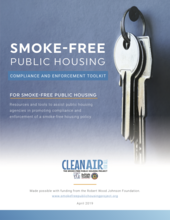
A majority of property managers report that a smoke-free policy is largely well followed and self enforced by residents and staff. However, it is not uncommon for a small minority of residents to struggle or refuse to comply by continuing to smoke or allowing their guests to smoke on the property. These resources and tools can assist management in promoting compliance and enforcing the policy when necessary. If you would like to consult on solutions specific to your situation, reach out to [email protected].
Topics: Health, Healthy homes, Smoke-free
 Shared by Jackie Siewert
on Oct 3, 2019
Shared by Jackie Siewert
on Oct 3, 2019 0
0
0
Environmental health services, from asthma home visiting programs to lead testing, can help protect children from the dangerous environmental exposures they encounter every day. But the problem for parents and caregivers is accessing such services, a new analysis from APHA’s Center for Public Health Policy shows.
Topics: Asthma, Child welfare, Health, Healthy homes, Housing, Lead, Low-income, Place-based, Preventative care, Research, Safety
0
0
0

Content for this app was developed specifically for middle schoolers and educates them on the principles of a healthy home in a preteen-friendly format. Navigation is simple and intuitive. Interactive features include the Train the Brain and the ability to save a list of items found in their home. Colorful graphics highlight many different hazards that can occur in homes, such as lead, mold and moisture, pests, and more.
Topics: Child welfare, Health, Healthy homes, Housing, Lead, Low-income, Place-based, Safety, Youth
0
0
0
Topics: Asthma, East Coast, Health, Healthy homes, Housing, Low-income, Partnerships, Supportive housing
 Shared by Housing Is
on Jul 27, 2018
Shared by Housing Is
on Jul 27, 2018 0
0
0
While links between housing deficiencies and health conditions are well substantiated, research evaluating the health benefits of specific interventions has been limited. There is, however, some evidence that multifaceted interventions may lead to improvements in health of children and families, as well as to reduced use of medical services.
Topics: Community development, Funding, Health, Healthy homes, Medicaid / Medicare, Seniors
 Shared by Housing Is
on Jul 19, 2018
Shared by Housing Is
on Jul 19, 2018 0
0
0
The link between federal housing policy and public health has been understood since the nineteenth century, when housing activists first sought to abolish slums and create healthful environments. This article describes how the Obama administration—building on these efforts and those that followed, including the Great Society programs of President Lyndon Johnson—has adopted a cross-sector approach that takes health considerations into account when formulating housing and community development policy. The federal Department of Housing and Urban Development fully embraces this “health in all...
Topics: Affordable Care Act, Community development, Disabilities, Health, Healthy homes, Housing, Legislation & Policy, Low-income, Mobility, Partnerships, Place-based, RAD, Research
 Shared by Housing Is
on Jul 19, 2018
Shared by Housing Is
on Jul 19, 2018 

